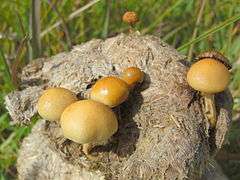Protostropharia
Protostropharia, is a coprophilous agaric fungal genus that produces glutinous, mostly yellowish to yellow brown fruit bodies. Characteristically most form chrysocystidia and rather large, smooth, violaceous basidiospores each with a prominent germ pore (as Stropharia subg. Stercophila[1][2]). It is differentiated from Stropharia by production of astrocystidia on its mycelium rather than by acanthocytes that Stropharia produces.[3][4][5][6] Phylogenetically, Protostropharia is distinct from Stropharia, Pholiota, and Leratiomyces.[7][8] Two species, P. luteonitens and P. tuberosa, form pseudosclerotia in the dung substrates.[9][10]
| Protostropharia | |
|---|---|
 | |
| Protostropharia semiglobata growing on llama dung in South America | |
| Scientific classification | |
| Kingdom: | |
| Division: | |
| Class: | |
| Order: | |
| Family: | |
| Genus: | Protostropharia Redhead, Moncalvo, & Vilgalys (2013) |
| Type species | |
| Protostropharia semiglobata | |
| Species | |
|
Protostropharia alcis | |
Etymology
The name Protostropharia refers to the less anatomically complex astrocystidia (Greek proto-) as compared to the acanthocytes in Stropharia.
References
- Kytövuori I. (1999). "The Stropharia semiglobata group in NW Europe". Karstenia. 39: 11–32.
- Noordeloos ME (2011). "Strophariaceae s.l.". Fungi Europaei. 13: 1–658.
- Redhead SA (2013). "Nomenclatural novelties" (PDF). Index Fungorum. 15: 1–2.
- Redhead SA (2013). "Nomenclatural novelties" (PDF). Index Fungorum. 18: 1.
- Redhead SA (2014). "Nomenclatural novelties" (PDF). Index Fungorum. 148: 1.
- Redhead SA (2014). "Nomenclatural novelties" (PDF). Index Fungorum. 158: 1.
- Moncalvo JM, Vilgalys R, Redhead SA, Johnson JE, James TY, Catherine Aime M, Hofstetter V, Verduin SJ, Larsson E, Baroni TJ, Greg Thorn R, Jacobsson S, Clémençon H, Miller OK (2002). "One hundred and seventeen clades of euagarics" (PDF). Molecular Phylogenetics and Evolution. 23 (3): 357–400. doi:10.1016/S1055-7903(02)00027-1. PMID 12099793.
- Walther G, Garnica S, Weiß M (2005). "The systematic relevance of conidiogenesis modes in the gilled Agaricales". Mycological Research. 109 (5): 525–44. doi:10.1017/S0953756205002868. PMID 16018308.
- Clémençon H, Roffler U (2003). "The pseudosclerotia of the agaric Stropharia luteonitens". Mycological Progress. 2 (3): 235–238. doi:10.1007/s11557-006-0061-4.
- Redhead SA, Kroeger P (1987). "A sclerotium-producing Hypholoma from British Columbia". Mycotaxon. 29 (1): 457–465.